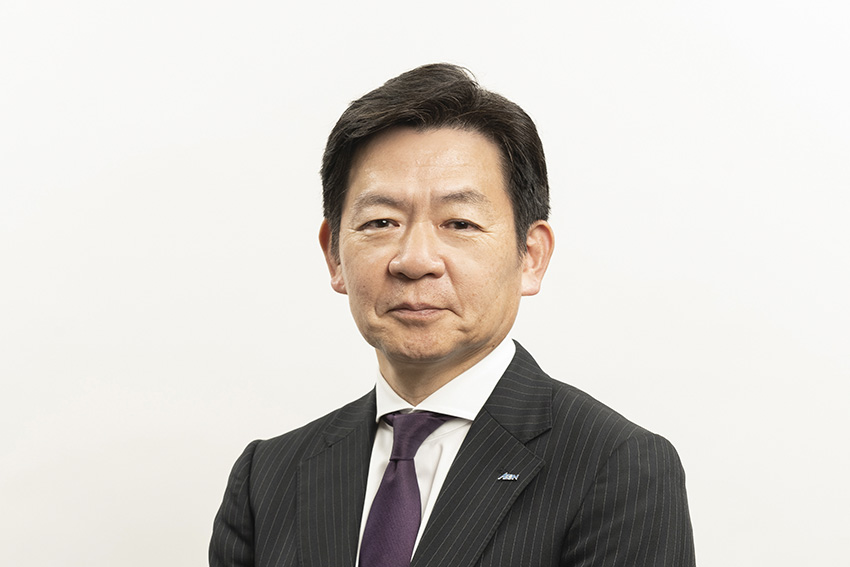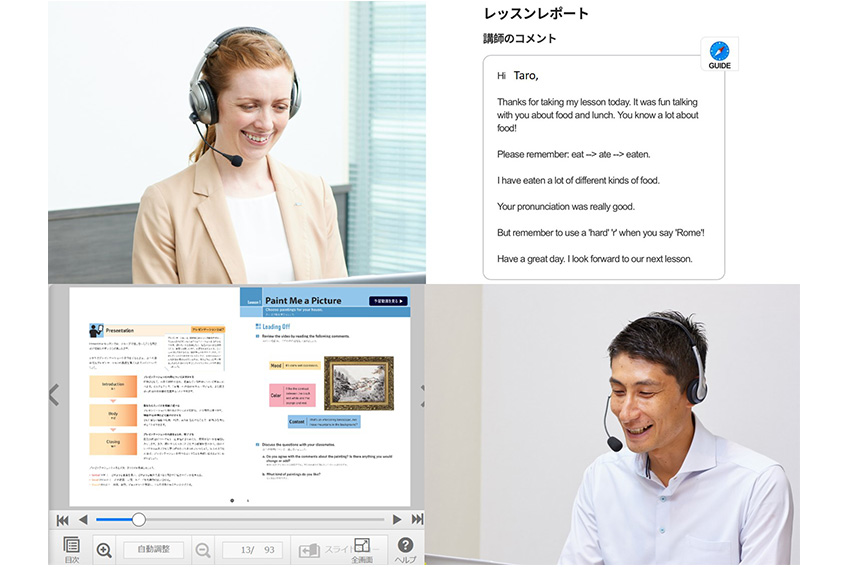With English education at its core, AEON is providing both students and teachers the chance to grow with a global mindset through its educational services.

One challenge Japan is facing is the declining population and the resulting reduced global-ready labor force. To rectify this, there’s been a focus on increasing the English language skills here in Japan. The Ministry of Education has laid out a new English education reform plan, making English compulsory for fifth and sixth graders and setting new proficiency targets based on the Common European Framework of Reference for Languages (CEFR). What role do you think that private education institutions can play in addressing these challenges?
First, if we focus on the negative aspect, you are right that the population is decreasing and the number of young kids especially is decreasing quickly. On the other hand, the necessity of English in Japanese education is increasing, so the number of parents who want their kids to learn English is growing. I think the total market is not that small and may even be growing. At AEON, we’re shifting our main target from adults to kids, and even during the COVID period, the number of child students didn’t decrease, while the number of adult students decreased a lot. That means they are more serious about learning and becoming proficient in English. In that sense, we are not that pessimistic, and we will keep focusing on the kids’ education. To do that, we need to provide good value for those people.
One good thing is the change in the Japanese education policy. That used to be focused on reading and writing rather than listening and speaking, and in that regard, the English taught in school, and that taught at English conversation schools like ours were totally different things. Our school was often treated as something like a hobby or complementary skill training for the future. However, those two educational experiences are becoming similar, and even public schools now require more speaking and listening capability, so I think our education policy and that of public schools are almost the same. That means that what we’re providing right now can directly contribute to complementing the school study and also help with entrance exams, which is good for us because more parents want to send their children to these kinds of schools, the same as with other juku, or cram schools.

I think that even though we aren’t changing what we have been doing for these 50 years, our work can contribute to helping more students. We are more focused on improving speaking or communication skills, so that’s AEON’s education policy that we are trying to emphasize in the market. That is one thing.
Another way we can help is to help the public schools and their teachers because a lot of school teachers don’t have good English-speaking capability, and they sometimes have difficulty communicating with their assistant language teachers (ALT), so we provide some content to help those Japanese teachers communicate with their ALT. That content has become very popular. We created it together with a publishing company, and they provided that content for schools, so it is being used quite a lot.
We are also supporting the association called J-SHINE, which is certifying English teachers for elementary schools. We provide some classes for those wishing to be teachers, or they can take courses directly from that organization to get their qualifications or certification to teach in Japanese public schools.
So, we are helping with those kinds of activities, and we can contribute directly to the students and also the schools and school teachers.
To return to your point about parents seeing the value of English, that’s obviously a very complex issue. What do you see as the main cultural shift? Is it the government’s policy or a younger generation of parents that sees more value in English?
I think there are two aspects. One is societal change because the world has become globalized, so more Japanese have an opportunity to communicate with foreign people, especially with more of them traveling abroad. Therefore, they feel they need that capability more than in their parents’ era. I would say that many of the parents who send their children to our schools don’t speak English, so they know how much they are missing and they don’t want the same experience for their children. So, that’s one motivation for parents to send their children to study.
The other aspect is the change in the education policy of the Japanese government. As I mentioned, studying in a school like AEON can complement or support school study and help with entrance exams. For example, if they have a certain EIKEN (Test in Practical English Proficiency) level, they don’t need to take the English entrance exam (or they are given additional score on their English entrance exam) from many schools, so many students or their parents want to have achieved Grade 2 on that exam by the end of junior high school and Grade Pre-1 by the end of high school.
Coming to Japan has never been more popular, and the country is welcoming a record number of inbound tourists, with the latest estimate of 37 million. Many people are also looking for opportunities to come and live in Japan. Of course, teaching English is one of the most accessible options. If you were to speak to people who are thinking of coming to teach English for your company, what would you say to them about teaching in Japan?
We have a recruiting office in the US, and when we get that question, I ask how the candidate thinks when they apply. Many of them have had some very good experiences in Japan by traveling or studying, and they want to return and stay here for a longer time. Many of them also mentioned that they received a lot of hospitality and kindness here, so they felt they wanted to give back to somebody else when they came back to Japan. That might be one motivation for them to come back to Japan, and, of course, many of them also have an interest in pop culture, like anime, so they want to live in Japan for a while to experience the culture directly. Their salary level is lower than in the US, and the yen is very weak now, but even with that difficulty, many of them want to come here.
For AEON in particular, many people who used to work here and have gone back to their country recommend us to their friends and acquaintances. We also have quite good support for our foreign teachers in terms of their training and communication with other staff, so they have a good experience while they are here. Other benefits for those foreign teachers who come here include personal interaction with the local people and the hospitality of Japan and its citizens. They also experience cultural norms and customs that differ from other countries, and they can improve both their interpersonal and professional communication skills. These interpersonal skills extend from dealing with kids to elderly people, so that is a good experience to bring to their lives and can be helpful in their careers back home.
The COVID pandemic had a huge effect on society, and for the education sector, many lessons moved online. Your company has been doing this with your Net Campus and online lessons. You’ve also been using AI and VR technology. Do you plan to leverage more of these online lessons?
Yes, we are trying to do that, and the online lessons business expanded a lot during COVID-19, but we believe there are several types of online lessons. One type of online lesson is the one mainly communicating with teachers in foreign countries, such as Philippine, as many as they want at a low price. That is good for people who already have a certain level of English conversation ability. However, for people who don’t have that level of speaking ability, it is quite difficult to improve with that type of online lesson, so we also have different types of online lessons. For example, we have lessons with a textbook and real teachers who know how to teach English and how to improve their students’ speaking skills and provide feedback after the lesson. By providing that kind of comprehensive English school lesson, I think it can be an alternative to in-class lessons for people to improve their English.

So, that’s what we’re doing, and although our customers have been quite satisfied with our online lessons from the beginning, we try to keep improving them. We used to have a system capacity problem, so we couldn’t expand those lessons very much, but we recently solved that problem, and we are trying to advertise more to accept more online lesson students. We are also using digital applications and other tools, including an AI Speak Tutor, which allows people to have free conversations with AI. However, people cannot improve their English with only those kinds of digital tools because the conversation needs human interaction, so to improve real conversation skills, we still need schools and classes. Still, the time they can spend in the school is very limited, maybe one or two hours a week. That’s not enough, so by complementing that time, those kinds of digital tools or online lessons are valuable.
We believe the combination of school lessons, online lessons, and digital tools will be important to improve students’ capability. For example, to speak English better, people need some basic knowledge, like vocabulary and grammar, but they don’t necessarily need to work on these things in school because they can learn by themselves or online, so for those kinds of skills, we can provide the opportunity for them to learn online or in their house, and in the school, we should give them more opportunities to speak. Therefore, we are shifting our in-school classes to that type of focus while packaging online lessons and digital tools for the student to learn more in their home.
AEON also provides ways for students to experience life beyond Japan through your subsidiary companies. For example, you have educational homestays, study abroad opportunities, and intercultural exchanges. Can you tell us more about your cross-cultural exchange event, which AEON held alongside HAO Chinese Academy, Ryugaku Journal, and Intercult?
Yes. We didn’t expect those kinds of events to become that popular, but as a matter of fact, the participants enjoyed it a lot, so I think we want to continue. In the beginning, I was concerned about that kind of event because they invited Chinese, English, and Japanese class students, and people came because they wanted to speak the language they were studying. Therefore, I was concerned about whether that would have value for everyone. However, once we did that, everyone talked to each other and enjoyed the different cultures, etc., so if that works, I think that is really what AEON wants to do because we believe we are not just an English school. We want also to show our students the value of speaking English. The same goes for the Chinese and Japanese languages. Thus, we feel like providing those kinds of opportunities is a benefit we can offer.
When talking about moving into the international market, other Japanese players have begun to expand and open schools overseas, in places like Vietnam and Taiwan. Is this something that you are considering, and if so, are there any countries that you are targeting in particular?
Yes, but that doesn’t mean that we need to open physical schools there. We may open online classes for those and other countries. Actually, we are already offering Japanese lessons in some countries. However, for English lessons, if we just teach English, we don’t have any added value because there are already many other companies there. I think what we need to do as an AEON policy is to show a clear vision for the students to learn English and to change our textbooks or curriculums for other countries. If we create that kind of tailored content, we might offer real value outside of Japan. If not, especially for English, we probably won’t be able to be successful.
Are you looking to expand your Japanese language teaching, and is that something that you would like to be more known for in the future?
Intercultural Institute of Japan (Intercult) has been accepting foreign students in Japan, but only people who have time and financial resources have been able to come to Japan and study there. They want to expand that opportunity to other types of students who want to learn Japanese but don’t have enough time or financial resources to come to Japan.
In 2018, KDDI acquired AEON. Six years on, what are some synergies that you’ve been able to generate between KDDI and AEON?
Merging the English teaching capability of AEON with the latest KDDI technology, the first thing we have done is to develop digital tools like AEON Net Campus and data analytics. By analyzing student attitudes, behavior, and other data, we can send that information to the teachers or assistants to support them in advance, which helps with student retention. That was the first thing we did. We are also using their AI capability to provide the AI learning tool I mentioned before, which analyzes a student’s speaking and can tell the student where they are strong and weak.
One key part of KDDI’s corporate strategy is nurturing future-centric talent, and its midterm strategy is called its satellite growth strategy. For that, the center is the telecom network, and around that, there are many businesses like finance, power grid, etc. Within that strategy, they are also focusing on education, especially for children, and that caters to their focus on nurturing future talent, so for them, the capability of AEON is very useful because they don’t know much about education. Therefore, AEON is providing this kind of content. KDDI has an application called AEON Channel, which mixes entertainment with AEON’s capability to create English content for KDDI customers, which is used quite a lot.
You’ve been quite active in terms of partnerships and mergers, for example, with HAO Chinese Academy and Intercult, which you already mentioned, and a few others. Are you looking for further partnerships or mergers, and if so, does that include the international market?
At this moment, I can’t be very detailed, but yes, we’re looking for some partnerships or mergers mainly to expand the scope of our business to go beyond just English. For example, we recently announced a collaboration with the company Atama Plus, which offers an AI-based education system that is not for English conversation but for things like mathematics and history. We will open Atama Plus schools in the same places where we have AEON schools, so we will be their franchisee, and we will provide their services together with AEON’s English classes. By doing that, we will hopefully retain younger students who often stop learning after they get older because they move to prep schools to study for entrance exams. Instead of losing those students, we can now provide them with the Atama Plus prep school services while they continue studying English. In that way, I think you can say combining those two services will provide a good synergy, and if we can expand the scope of our business in a similar way, then yes, we are interested in other opportunities for collaboration.
The future looks exciting with AI and its associated benefits! If we were to think about a second interview with you in 2030, what would you imagine the achievements of AEON would be at that time?
That’s a big question. I think AI will improve a lot. Currently, with AI tools, we can only offer free conversation, which is good, but if it can analyze or correct our conversation, give suggestions for better expressions, or develop a customized curriculum to improve a student’s weak points, that can be very helpful. If we can have those kinds of tools, schools, and teachers, we can focus on human-to-human conversations while students learn everything else from the AI tools. I think the AI tools will improve in that way within that five- or six-year time frame.
For more information, please visit their website at: https://www.aeonet.com/
0 COMMENTS